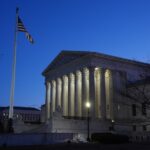
–>
August 7, 2022
Every year kids from around the country enter a contest, the Spelling Bee, to test their ability to spell often difficult words better than anyone else. If adults held a Constitution Bee, the winner this week would be Florida governor Ron DeSantis and the loser would be White House Spokesperson Karine Jean-Pierre.
‘); googletag.cmd.push(function () { googletag.display(‘div-gpt-ad-1609268089992-0’); }); }
It has been the game in many states, particularly those where the attorney generals were elected with a big assist from leftist moneybag George Soros and friends, to refuse to enforce (usually criminal) laws adopted by state legislatures with which they disagree. This week, Governor DeSantis played his ace in the hole, removing state attorney Andrew Warren for overstepping his constitutional boundaries.
Professor Charles Lipson explains why this move was so significant and warranted.
A major part of DeSantis’s criticism of Warren was “constitutional.” The vital point here is that legislative bodies, not prosecutors, are responsible for making our laws. The executive branch is tasked with enforcing them, not rewriting them to suit their fancy. Unfortunately, in city after city, that is exactly what “social justice” prosecutors have done. They have simply declined to prosecute whole classes of crimes, laid out in laws passed by state assemblies or city councils.
‘); googletag.cmd.push(function () { googletag.display(‘div-gpt-ad-1609270365559-0’); }); }
If a legislature passes laws sanctioning actions A, B, C, and D as crimes, then it’s not up to the district attorney to say “I will only enforce A and B.” He doesn’t have that right or responsibility. It is his right to say “Given my office’s limited resources and the weak evidence against Mr. Jones in this case, I will not prosecute him for C and D.” Ron DeSantis acknowledged as much.
All across the country, however, Justice Democrats have said they will not prosecute whole classes of crimes as a matter of principle. In doing so, they are acting as one-man legislatures. That’s true whether they are elected or appointed. They are still executive officials and are not authorized to ignore whole classes of duly passed laws.
DeSantis nailed that point, making an effective argument that Warren was guilty of exactly this kind of overreach. That’s a serious violation if we are to remain a country of laws, not men, where our government at all levels is grounded in the separation of powers between the executive, legislative, and judicial branches.
To make certain Warren’s suspension was carried out swiftly and preclude any ambiguity, DeSantis had the police enforce his directive suspending Warren from office.
As of the signing of this Executive Order, the Hillsborough County Sheriff’s Office, assisted by other law enforcement agencies as necessary, is requested to: (i) assist in the immediate transition of Andrew Warren from the Office of the State Attorney for the 13th Judicial Circuit of Florida, with access only to retrieve his personal belongings; and (ii) ensure that no files, papers, documents, notes, records, computers, or removable storage media are removed from the Office of the State Attorney for the 13th Judicial Circuit of Florida or any of his staff.
At the opposite extreme, the White House spokesperson Karine Jean-Pierre revealed she has no idea who decides the constitutionality of laws, the Supreme Court apparently not being the venue for such things to her way of thinking.
‘); googletag.cmd.push(function () { googletag.display(‘div-gpt-ad-1609268078422-0’); }); } if (publir_show_ads) { document.write(“
In a presser explaining how the White House was trying different moves to preserve abortion in states which no longer permit it after the Supreme Court in the Dobbs case overruled its prior decision in Roe v. Wade, she indicated that the Dobbs decision was “unconstitutional.”
I think the other thing to think about is: You know, the President has executive authority, but he also has to make sure he talks to the legal experts, right? He has to make sure that the ideas that we have or come up with can be done. And so that’s also a big part of it, too.
This is still — you know, this is a government. And so there are ways — there — there’s steps and processes that we have to take in order to take actions as big as — as big as these. And so that’s something, as well, to take note.
But look, there has been an urgency from this President from day one when — when the Supreme Court made this extreme decision to take away a constitutional right. It was an unconstitu- unconstitutional action by them — a right that was around for almost 50 years, a right that women had to make a decision on their bodies and how they want to start their families.
 The Supreme Court has been the final arbiter of the law since 1803, when in Marbury v. Madison the court determined that it had the final say on laws and statutes it believed violated the Constitution. From time to time scholars have taken issue with that division of power, but it is particularly ironic that Democrats, which from the time of FDR insisted the Court was indeed the final arbiter of laws in this country, contend the opposite.
The Supreme Court has been the final arbiter of the law since 1803, when in Marbury v. Madison the court determined that it had the final say on laws and statutes it believed violated the Constitution. From time to time scholars have taken issue with that division of power, but it is particularly ironic that Democrats, which from the time of FDR insisted the Court was indeed the final arbiter of laws in this country, contend the opposite.
…liberals doubled-down on the view that the Supreme Court — rather than politicians — was in charge of how to interpret the Constitution. A prominent group of liberal lawyers and legal scholars declared, “[t]he Constitution is our supreme law” and “in cases of disagreement we have established the judiciary to interpret the Constitution for us.” Many of the same lawmakers who had, as young New Dealers in the 1930s, joined Roosevelt in lambasting the right-wing Supreme Court, now decided, in the 1950s and ’60s, that Roosevelt’s court-packing plan had been a dangerous overreach, contrary to the rule of law. For politicians to challenge the justices as Roosevelt had done now seemed to invite segregationist defiance and lawlessness.
Liberal reformers and their allies began to fight court-centered battles not only for racial justice, but also for women, consumers and the environment. In the process, they embraced a legalist outlook and tool-kit earlier generations had shunned that emphasized individual-rights claims, strong judicial oversight of public authorities and legalistic, procedural conceptions of fairness and equality. These liberal reformers won some great victories — not only Brown v. Board but Roe v. Wade and many others. And in the process, liberals learned to love the courts and to imagine that constitutional law was separate from politics — an outlook that would have flabbergasted Madison, Jefferson, Lincoln and Roosevelt.
Oh, well, it’s not the first and won’t be the last time people change their minds about the Constitution depending on their politics, nor is Dobbs the first and only time the Supreme Court has changed its mind. It has done so dozens of times.
The most significant reversal to me was not the Dobbs case, but the series of cases beginning with Brown v. Board of Education which in 1954 finally overruled Plessy v. Ferguson, an 1896 case which held that racial segregation was constitutional.
The length in which a wrongfully decided case has stood is not a mark of its constitutionality, and a wrongfully decided case is not entitled to perpetual adherence.
In any event, it’s not unreasonable to have a final arbiter of such things, and within the framework of the Constitution people unhappy with the outcome usually have means to correct it in the legislative branches. As for abortion, it appears to be banned now in 11 states and banned after six weeks in four more.
Among the administration’s attempted work-arounds for the Dobbs decision is a lawsuit against Idaho under the Emergency Medical Treatment and Labor Act in which it is claimed that to comply with the law — for example in the case of ectopic pregnancies — would subject doctors to criminal proceedings, The Idaho attorney general called the lawsuit “politically motivated.” Certainly it is. The question is whether the Department of Justice has a solid case, and I don’t think it does. I am unaware of a single case where surgery to end an ectopic pregnancy was deemed an abortion despite pro-abortion advocates suggesting abortion bans may cover them.
<!– if(page_width_onload <= 479) { document.write("
“); googletag.cmd.push(function() { googletag.display(‘div-gpt-ad-1345489840937-4’); }); } –> If you experience technical problems, please write to [email protected]
FOLLOW US ON
<!–
–>
<!– _qoptions={ qacct:”p-9bKF-NgTuSFM6″ }; ![]() –> <!—-> <!– var addthis_share = { email_template: “new_template” } –>
–> <!—-> <!– var addthis_share = { email_template: “new_template” } –>






